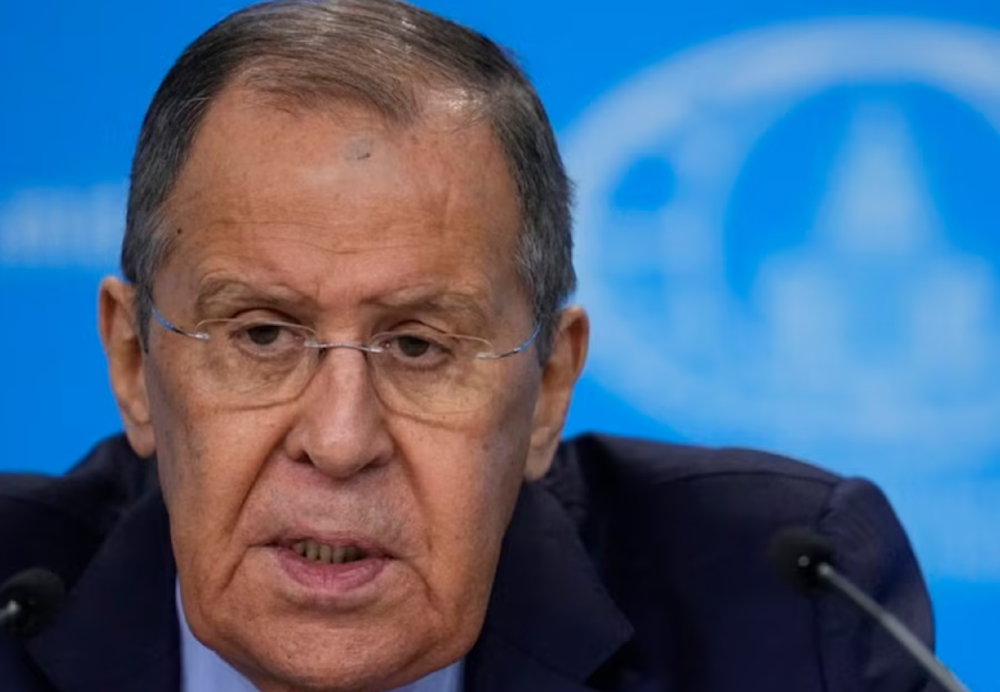Israeli attack on Iranian nuclear sites 'serious provocation': Lavrov
According to Lavrov, the IAEA, which closely monitors Iran's nuclear program, "sees no indication that Iran has begun to convert the nuclear program into a military option."
-

Russian Foreign Minister Sergey Lavrov speaks at his annual news conference in Moscow, on January 18, 2024. (AP)
Russia follows the International Atomic Energy Agency's (IAEA) assessments, which show no evidence that Iran is attempting to transform its peaceful nuclear program into a military one, said Russian Foreign Minister Sergey Lavrov/
During a press conference on the sidelines of the East Asia Summit, in response to a question from Sputnik, Lavrov warned that any Israeli attack on the facilities of Iran would be a "very serious provocation."
The IAEA, which closely monitors Iran's nuclear program, "sees no indication that Iran has begun to convert the nuclear program into a military option," the Minister continued.
Lavrov earlier accused the US of encouraging "Israel" to expand its war zone into Lebanon by failing to condemn Tel Aviv.
In a statement, the Russian top diplomat said, "Since Israel launched its ground invasion of Lebanon on the night of October 1, there has not been a single word of condemnation on behalf of the US administration about this act of aggression against a sovereign state," adding that "this way, Washington is actually encouraging its Middle East ally to keep expanding the war zone."
Escalation in Middle East to be disastrous: Kremlin
The escalation of hostilities in the Middle East might have disastrous effects for the whole region, Kremlin spokesperson Dmitry Peskov stated on Thursday.
Peskov told reporters that the effects of the expansion of war in the region would lead to the "crumbling of civilian infrastructure and hundreds of thousands of people losing their jobs and homes."
"Therefore, I do not want to even think about the further expansion of the geographical area, as the consequences of all this would be catastrophic for the whole region," he stated.
The official added that it was inappropriate to speculate on whether "Israel" intended to attack Syria and that the spread of hostilities in the area to the Lebanese front was a source of considerable concern for Moscow.
Peskov expressed, "Unfortunately, the geography of the conflict is still expanding. It is noteworthy that the Lebanese front has now been incorporated."
Gulf states urge US to stop 'Israel' from attacking Iranian oil sites
Gulf states are urging Washington to prevent "Israel" from bombing Iran's oil assets, fearing the targeting of their oil facilities by the Axis of Resistance, three Gulf sources told Reuters.
Saudi Arabia, the United Arab Emirates, and Qatar are refusing to allow "Israel" to fly over their airspace for any attack on Iran and have informed Washington of this, according to three government sources.
During discussions this week, Iran warned Saudi Arabia that if "Israel" was given any aid in carrying out an assault, the Kingdom's oil infrastructure would be at risk, according to a senior Iranian official and an Iranian diplomat.
Ali Shihabi, a Saudi expert close to the Saudi royal court, divulged that "the Iranians have stated: 'If the Gulf states open up their airspace to Israel, that would be an act of war.'"
Despite recent Saudi-Iranian reconciliation, the United States military presence in Gulf states is noticeable. Concerns over oil security and regional warfare have affected negotiations between Emirati authorities and the United States, particularly after Yemen's Ansar Allah launched missile assaults on UAE oil facilities.
Gulf sources told Reuters that protecting all oil sites remained a difficulty, thus the key approach remained to signal to Iran that Gulf states represent no danger.
Sanctions in lieu of hitting Iran oil facilities: US offer to 'Israel'
President Joe Biden has cautioned "Israel" not to attack Iran's nuclear installations, and US officials are concerned that an assault on the country's energy infrastructure may destabilize energy markets, Bloomberg reported. However, with the Israeli response against Iran likely at any time, the US has little confidence that the situation would not worsen further.
After Iran's Operation True Promise 2, Biden is desperately attempting to confine any Israeli response to military targets such as air bases and missile installations. To this end, rather than "Israel" targeting oil facilities or other economic targets, the US is offering options such as a new wave of economic sanctions, according to anonymous individuals familiar with the situation.
The US strategy is to provide Israeli Prime Minister Benjamin Netanyahu with an out, allowing him to reject calls from hardliners in his coalition for considerably harsher reprisal. It remains to be seen if he will accept it, especially considering that the Biden administration has so far refused to impose its views by suspending military aid to the occupation.
Gallant on Wednesday vowed that “our attack on Iran will be deadly, precise and above all surprising. They will not understand what happened and how it happened. They will see the results.”
Gallant misled the public into believing Iran's strike was a failure, something widely debunked in recent reports.

 5 Min Read
5 Min Read








